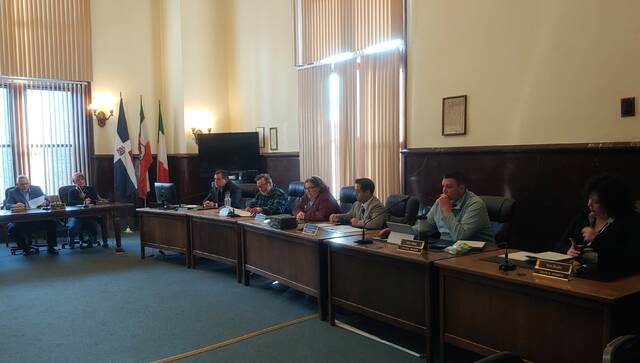
Luzerne County’s Commission on Opioid Misuse and Addiction Abatement held a public town hall meeting Monday at Hazleton City Hall to discuss its work and accept feedback. From left, are: county Correctional Services Division Head James Wilbur, council-appointed citizen Mary Butera, county District Attorney Sam Sanguedolce, county Chief Solicitor Harry W. Skene, county Manager Romilda Crocamo, county council Chairman John Lombardo, county Drug and Alcohol Administrator Ryan Hogan and county Human Services Division Head Megan Stone.
Jennifer Learn-Andes | Times Leader
A dozen Luzerne County residents attended Monday’s opioid commission town hall in Hazleton, with some sharing success stories and identifying needs.
The county’s Commission on Opioid Misuse and Addiction Abatement makes recommendations to county council on project earmarks from opioid litigation settlement funds and periodically holds public sessions throughout the county to provide program updates and accept feedback.
Joe Aiello updated the panel on his progress providing housing for men recovering from opioid use disorder. He operates two licensed recovery houses — one in Plymouth and the other in Edwardsville — and is in the process of securing approval for a third in Edwardsville, all under the name of Restored Roots.
His houses are occupied by four or five men, always including some with longer periods of sobriety to serve as mentors, he said. Aiello said he opted for smaller dwellings so he does not have to seek zoning exceptions.
Aiello said the houses are well-kept, which has made them acceptable in the community and an incentive for those in recovery to follow their sobriety program and rebuild their lives.
“We provide them with a dignified place to live and some hope,” Aiello said, beaming at the resulting burst of applause from the group at Hazleton City Hall.
Lisa Vinciguerro spoke of two Guardian Angel Recovery Houses for women that she operates in Hazleton and Wilkes-Barre, repeatedly referring to the occupants as “my girls.”
While acknowledging support services have markedly improved in recent years, she said more are available in the county’s northern half. Public transportation is a barrier for southern county residents, Vinciguerro said.
Linda Loop, founder and CEO of Dress for Success Luzerne County, agreed with Aiello’s use of the word dignity. As part of her nonprofit’s mission to empower women, Loop has worked with female inmates and said she is also helping to prepare those in recovery with the skills necessary to work as certified recovery specialists.
She described a female inmate released in the winter with only the shorts, tank top and flip flops she had worn upon incarceration in the summer. Loop’s nonprofit rustled up a travel bag with clothing and essentials so the woman could “hold her head high” as she entered a drug rehabilitation program, she said.
In addition to Crocamo, the following serve on the opioid commission: county Council Chairman John Lombardo, council-appointed citizen Mary Butera, county District Attorney Sam Sanguedolce, county Drug and Alcohol Administrator Ryan Hogan, county Human Services Division Head Megan Stone and county Correctional Services Division Head James Wilbur. County Chief Solicitor Harry W. Skene also attended Monday and ensures county compliance with settlement regulations.
Sanguedolce said the opioid epidemic has changed past mindsets that the addicted were “those people” or “bad people” because the number impacted by opioids has been so widespread in all classes and walks of life.
Crocamo told attendees Monday the settlement provides a “unique opportunity to make meaningful change locally and support those in need.
“As we move forward, let us remember that healing will take time, effort and collaboration,” she said.
In total, the county is expected to receive approximately $30 million over 18 years from the state’s settlement against opioid manufacturers and wholesale distributors. Council voted last August and December to earmark $2.56 million for a range of internal and outside projects that met eligible uses, including programs that provide medication-assisted treatment at the prison, warm hand-off and recovery specialist services and treatment and prevention education.
Applications and information about eligible uses for the settlement funds are posted on the commission’s section at luzernecounty.org.
Reach Jennifer Learn-Andes at 570-991-6388 or on Twitter @TLJenLearnAndes.



